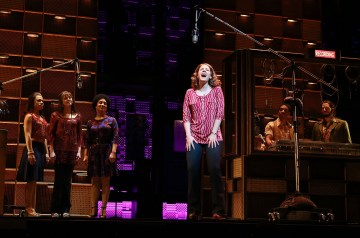Carole King performs on stage in London, in 1972.
A strange transformation is taking place in the New York theater world. Cabarets are playing host to more and more Broadway stars, and more and more Broadway theaters are turning into cabarets. Sutton Foster, Norbert Leo Butz, Bebe Neuwirth and Linda Lavin (along with an occasional Hollywood ringer like Jeff Daniels) are among the musical stars who have recently headlined shows in Manhattan clubs like 54 Below and the Café Carlyle. Meanwhile, a growing number of Broadway and off-Broadway houses are being filled with shows that are little more than cabaret acts.
A Night With Janis Joplin, which opened on Broadway in October, re-creates a concert given by the rock belter whose four-year career blazed out in 1970 with her death of a drug overdose. Dee Dee Bridgewater played Billie Holiday in last fall’s off-Broadway show Lady Day, doling out a few autobiographical tidbits as she performs a couple dozen of the jazz singer’s most memorable numbers. After Midnight, another new Broadway musical, serves up, in a more or less random fashion, a slew of jazz hits from the Cotton Club era of the 1930s.
Some of these shows don’t pretend to be about anything more than the music. In What’s It All About? Bacharach Reimagined, currently drawing sellout crowds at the downtown New York Theater Workshop, singer-guitarist Kyle Rabko leads a song cycle of familiar Burt Bacharach–Hal David numbers, reinterpreted in fresh, melancholy new arrangements that make a good case for Bacharach’s adventurous melodies — though less so for David’s often clunky lyrics. “Each morning I wake up/ Before I put on my makeup”? If Dionne Warwick hadn’t recorded them, they’d be in the dustbin of pop history.
The goal of Beautiful: The Carole King Musical is hardly reinterpretation. This new biographical musical, just opened on Broadway, is an entertaining if utterly pedestrian recap of the career and work of King and her early-’60s songwriting partner (and husband) Gerry Goffin — reprising familiar hits like “Take Good Care of My Baby,” “One Fine Day” and “Up on the Roof” exactly as we remember them.
The show follows the successful formula of bio-musicals like Jersey Boys and Motown: The Musical: chronicling the rise to fame and fortune of a popular artist or group, slotting in their hit songs at the appropriate chronological points, hitting all the nostalgia buttons for a largely baby-boomer audience. Beautiful opens with Brooklyn teenager Carol Klein (Jessie Mueller) working through the usual problems with an overbearing Jewish mother (Liz Larsen) who wants her to play Bach, not dippy pop songs, on the piano at home. But Carole barges her way into the office of rock producer Don Kirshner (Jeb Brown), falls for aspiring lyricist Goffin (Jake Epstein) and in short order becomes half of one of the most prolific songwriting teams of the early-’60s Brill Building era.
With its sunny, paint-by-numbers account of King’s career, Beautiful makes even the mild grit of Jersey Boys look like a Scorsese film (and Inside Llewen Davis look like Beckett). A producer says he needs a song for the Shirelles — presto, Carole and Gerry serve up “Will You Love Me Tomorrow?” The songwriters can’t come up with a name for their new dance number. “Come on, Little Eva, think,” Carole tells her babysitter — who goes on to record “The Locomotion.” They have a friendly rivalry with another songwriting duo, Cynthia Weil and Barry Mann (“On Broadway,” “You’ve Lost That Lovin’ Feeling”), and the two teams top each other with new hits as if they were NBA forwards trading dunk shots.
Oh, there are troubles. King and Goffin’s marriage hits the rocks, they split, and King starts writing songs for herself. The show climaxes with her breakthrough album Tapestry, with its iconic feminist-era hits like “It’s Too Late” and “You’ve Got a Friend.” But King’s transformation from songwriter to performer — emblematic of the sea change in pop music from the factory-like Brill Building ethos to the more personal, Beatles-inspired era of the singer-songwriter — is treated too simplistically to really sink in. King, having moved to L.A. and written a few songs for herself, is simply coaxed onstage one night at the Bitter End, and — boom! — the next thing you know she’s at Carnegie Hall.

Jessie Mueller in the “Beautiful: The Carole King Musical” press preview on Nov. 21, 2013, at the Stephen Sondheim Theatre in New York City.
Beautiful shows the limitations of the Broadway bio-musical but it also its pleasures. The music is irresistible, with a succession of talented performers re-creating the familiar styles of groups like the Shirelles, the Drifters and the Righteous Brothers. Mueller has a mousy earnestness as King and does a decent enough approximation of her yearning vocals. The audience leaves the theater happy, musically satisfied and at least marginally more familiar with an important turning point in pop-music history. All that’s missing is the two-drink minimum.

